Outcome Highlights feature effective collaborations between researchers, policymakers, practitioners, and local communities in the NCCR North-South network.
No. 8 Voices of youth: young Tanzanians turn their lens on teen pregnancy
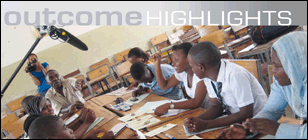
Tanzania has one of the highest teen pregnancy rates in the world. NCCR North-South research looks at how adolescents in Tanzania handle reproductive health challenges. In the project described in this
Outcome Highlights, youths in Dar es Salaam and Mtwara Town planned, scripted, and acted in short fictional videos about teen pregnancy. The videos are now used for reproductive health interventions targeting adolescents and have aired on Tanzanian TV.
 Download (PDF / 553 KB)
Download (PDF / 553 KB)
No. 7 Microbial risk assessment in Vietnam: Water, sanitation, and food safety – from training to policy
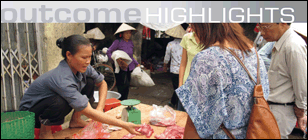
Environmental health risk assessment in general and microbial risk assessment (MRA) in particular are still at a very early stage of development in Vietnam. With its rapid urbanisation, industrialisation, agricultural development, and population growth, Vietnam faces increasing risks from pathogens contaminating its water and food supply. This
Outcome Highlights describes development of an MRA training course tackling issues of water, sanitation, and food safety. The course encouraged concerned groups in Vietnam to work together, leading to a local network on health risk assessment, enhanced training at the Hanoi School of Public Health, and creation of a book-length manual of MRA guidelines for food safety.
 Download (PDF / 897 KB)
Download (PDF / 897 KB)
No. 6 Atlases of human welfare: Mapping poverty and charting paths to prosperity in Southeast Asia
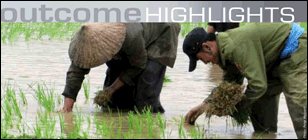
To truly help the world’s poor, we must know where they live, who they are, and as much as possible about the causes of their poverty. NCCR North-South researchers have led efforts to transform complex socio-economic data into readable maps that enable policymakers and development partners to see where poor people are clustered and identify spatially relevant contributors to their plight. This
Outcome Highlights recounts how maps and corresponding websites collaboratively created for Vietnam and Lao PDR inspired greater transparency and data sharing, thereby enhancing government and outside aid agencies’ ability to target aid to poor people in Southeast Asia.
 Download (PDF / 545 KB)
Download (PDF / 545 KB)
No. 5 Shared learning via community conversations: HIV prevention among Ethiopian pastoralists

HIV/AIDS is one of Ethiopia’s greatest public health concerns. While HIV/AIDS risk awareness is high among urban men and women, surveys have shown that people living in remote pastoral communities are poorly informed, particularly about methods of prevention like condoms. This
Outcome Highlights explains how training local facilitators and using a culturally accepted method of communication – community dialogues – successfully raised awareness of HIV/AIDS risks and prevention methods in several Ethiopian pastoral communities.
 Download (PDF / 721 KB)
Download (PDF / 721 KB)
No. 4 Steps to a safer, cleaner community: Household-Centred Environmental Sanitation in Lao PDR
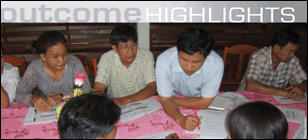
NCCR North-South researchers and partner organisations are striving to improve sanitation in developing countries. They seek to enable communities to play a central role in the planning, implementation, and maintenance of their sanitation systems. This
Outcome Highlightsdescribes application of a participatory approach to sanitation improvement in an urban settlement in Lao PDR. The project led to new sanitation infrastructure and a solid waste management system created with heavy community involvement.
 Download (PDF / 664 KB)
Download (PDF / 664 KB)
No. 3 One Health - Human and animal health specialists: making use of synergy
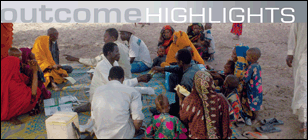
While human and veterinary medicine are kept separate in most countries, in many cases cooperation between the two sectors would save costs and better combat disease. This instalment of
Outcome Highlightsrecounts NCCR North-South partners' contribution to development and application of a One Health approach, bringing together human and animal health. Application of the approach led to improved health behaviour among mobile populations in Chad and better understanding of disease transmission patterns in Kyrgyzstan.
 Download (PDF / 1.12 MB)
Download (PDF / 1.12 MB)
No. 2 Land for Dalits: Supporting landless people in Nepal
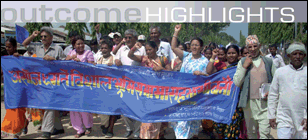
The Dalits of Nepal are a marginalised group who have suffered systematic discrimination within the local hierarchical social system. They often have no recognised rights to land or other resources. This edition of
Outcome Highlights relates the efforts of an NCCR North-South project aimed at establishing a dialogue between Dalits and government officials. The project was instrumental in anchoring the rights of landless Dalits in Nepal's interim constitution.
 Download (PDF / 924 KB)
Download (PDF / 924 KB)
No. 1 Risk management in Bolivia: Raising awareness and supporting prevention-oriented solutions
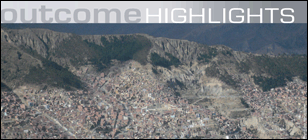
Despite the threat of natural disasters, adequate risk management policies are rare at the local level in Bolivia. This issue of
Outcome Highlights describes how NCCR North-South researchers and their partners tested a bottom-up, participatory approach to risk assessment and management in local communities. Their vulnerability mapping strategy and resilience study prompted municipal policy changes in Bolivia and garnered international attention.
 Download (PDF / 1.27 MB)
Download (PDF / 1.27 MB)